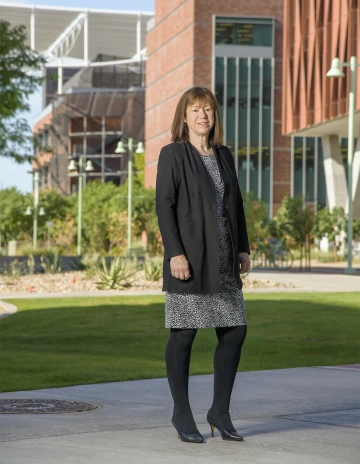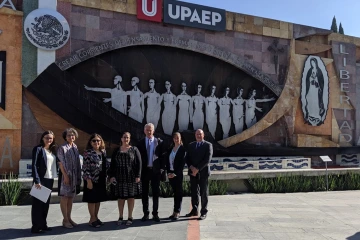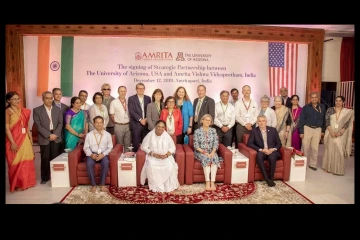Students, Countries Worldwide to Benefit from Health Sciences Global Education
University of Arizona Health Sciences International is expanding access to health-care education through international dual-degree programs.

Millions of students in emerging economies around the world do not have access to affordable higher education in the health-care professions. According to the World Health Organization, half the world cannot obtain essential health services. A new strategic initiative at the University of Arizona Health Sciences is focused on addressing both of those challenges.

Carol Gregorio, PhD, is assistant vice provost for Health Sciences International, head of the College of Medicine – Tucson’s department of cellular and molecular medicine and a member of BIO5 Institute.
“We're very attuned to the growing need for essential health-care services around the world, and by building programs and degrees through global and online education, we can train health-care professionals in multiple locations and benefit the countries where they will go into practice,” said Michael D. Dake, MD, senior vice president for Health Sciences.
The global coronavirus pandemic has highlighted the need for internationally focused educational programs, as many students are currently unable to travel to the U.S. to start or continues their degrees.
“COVID-19 raised our awareness of and sensitivity to global health issues to a new level,” Dr. Dake added. “Through Health Sciences International, we’re pursuing even more opportunities to ensure the professionals we educate will be helping to solve the world’s health-care challenges.”
Quality education on an global scale
Leading the charge is Carol Gregorio, PhD, interim executive director for Health Sciences International and assistant vice provost for Global Health Sciences. Dr. Gregorio is working closely with representatives from each of the five Health Sciences colleges to create or expand their online master’s degree programs. These courses will be used to create an interprofessional health sciences master’s degree, where students can enroll in classes across the five colleges, with the option to specialize in one area.
“Students will benefit from this broad health sciences education, with the flexibility to focus it on their interests,” Dr. Gregorio said. “We believe this interprofessional master’s degree will attract a wide variety of students. As examples, it could appeal to medical students who want to round out their education in public health and pharmacy, or international students who want a solid base in the health sciences before pursuing a professional degree. Or it could be attractive to undergraduate students looking to explore the health sciences.”
“We are poised to be leaders, and this is the right time to establish this initiative and expand our global programs.”Carol Gregorio, PhD, assistant vice provost for Global Health Sciences
Operating in tandem with University of Arizona International, the university’s hub for international educational activities and engagement, Health Sciences International master’s degrees will be fully online and available through University of Arizona International’s network of partner universities, residential communities and working spaces in more than 150 cities.
While each new program will require the typical 30 credits to complete, the course structure is being adapted to allow for a seamless global transition. Some of the university’s global partners operate under different credit structures, so courses will be divided into three individual one-credit classes, which students can select as needed to fulfill their home university requirements.
The interprofessional health sciences master’s degree is slated to start accepting students in Arizona and around the world in Fall 2022.
The microcampus network
Health Sciences International is building on the success of microcampus dual-degree programs already in place in the United Arab Emirates and Mexico through the Mel and Enid Zuckerman College of Public Health.

Leaders from University of Arizona International and the College of Public Health visited La Universidad Popular Autónoma del Estado de Puebla in Puebla, Mexico. Puebla is one of two current microcampus dual degree locations for the College of Public Health. (Courtesy University of Arizona International)
Students learn from faculty at both institutions, become part of two alumni networks, and advance their English language skills and communication style.
“Global Campus is the most extensive network of campuses in the world, taking the University of Arizona to students everywhere they are,” said Brent White, JD, dean of global campuses and vice provost for global affairs. “As such, Global Campus provides a unique platform for health education on a global scale.”
Ultimately, each Health Sciences college will have global university partnerships to support education and research.
Amrita University, with a main campus in Coimbatore, Tamil Nadu, India, is one of UArizona Health Sciences’ newest university microcampus partners. Dr. Gregorio visited Amrita with White, UArizona Provost Liesl Folks and several deans last year.

Dr. Gregorio, who visited Amrita University’s Amritapuri campus in Kollam, India, last winter, looks forward to growing the Health Sciences’ education and research opportunities with international partners. (Courtesy University of Arizona International)
A master’s program in cellular and molecular medicine through the College of Medicine - Tucson and Amrita hopes to accept students this fall. Faculty at Amrita are equally as enthusiastic about starting an international student research exchange between the two universities.
Dr. Gregorio said future plans for Health Sciences International include expanding degree program offerings to the professional and undergraduate levels.
“We aim to be known across the world for global health sciences education and research,” Dr. Gregorio said. “We are poised to be leaders, and this is the right time to establish this initiative and expand our global programs.”
Our Experts
Contact
Meaghan Miller
Office of Communications
520-626-2101
millerme@arizona.edu

